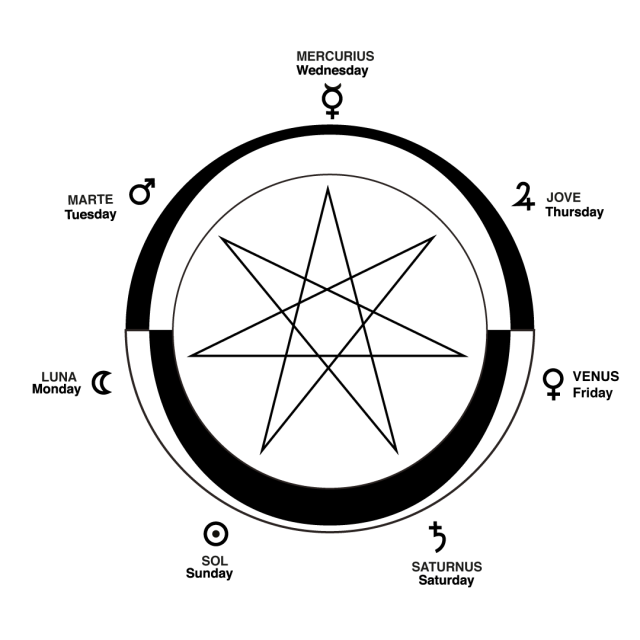While keeping in mind that the week is indeed a cultural artifact, it is worth noting that culture is not separate from nature, but instead it is part of nature, it is one of the things that nature is doing: a way for nature to look back at itself.
The seven days of the week as they are known all across Europe and Asia correspond to what is called the seven classical planets or seven luminaries: these are the seven things in the sky that don’t just revolve around the Northern Star like all regular stars do. They move differently. Of course, there are others, but these are what people of antiquity could see with the naked eye.

These are the Moon, Mars, Mercury, Jupiter, Venus, Saturn and the Sun.
Archetypally they correspond to gods of classical antiquity, and some questions that arise are why these 7 and not others? Does it mean something and if so, what? Is there a pattern?
It appears to me that there are 3 pairs and 1 singleton.
Starting with the singleton, there is Mercury, the unity of opposites, the androgynous, the messenger, the connector.
Then we have the 3 pairs:
- Venus and Mars
- the Moon and the Sun
- Saturn and Jupiter
As all dualities, they can be overlapped upon the duality of Yin and Yang.
Venus and Mars are mainly about the feminine and the masculine.
The Moon and the Sun can be seen as the cold and the hot.
Saturn and Jupiter is the last one that I have been struggling with, unable to find a way to pair them. But it finally came to me while studying the Transformers mythology. Making the long story short, Unicron and Primus correspond to Saturn and Jupiter as they stand for Chaos and Order.
The long story now: according to the Transformers lore, before the dawn of time, Order and Chaos exist within an extra-dimensional entity known as The One. To explore the fledgling universe, he creates the astral being known as Unicron, and then subdivides him, creating his twin, Primus.
It is worth noting that as in many other mythologies Chaos comes first and Order subsequently emerges from it.
In closing, I would like to add that it is not my intention here to tell you what the week means, but rather present a possible way of looking at things.
The more I learn about culture and its history, the less sense it makes for me in terms of linearity: everything happens all over again every now and then.
It is like a fractal, where you can zoom in and out at any point on the pattern to see that it repeats itself over and over again.
It is a matter of perspective.
